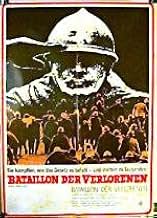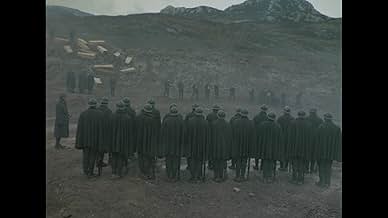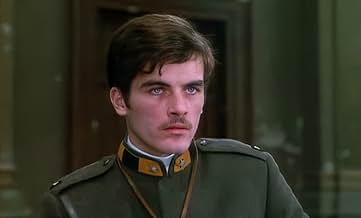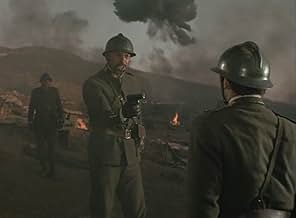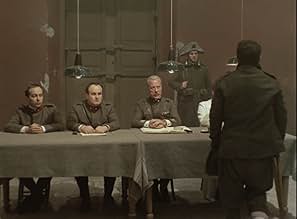IMDb RATING
7.6/10
2.1K
YOUR RATING
On the Italian/Austrian front during World War I, a disastrous Italian attack upon the Austrian positions leads to a mutiny among the Italian troops.On the Italian/Austrian front during World War I, a disastrous Italian attack upon the Austrian positions leads to a mutiny among the Italian troops.On the Italian/Austrian front during World War I, a disastrous Italian attack upon the Austrian positions leads to a mutiny among the Italian troops.
- Awards
- 1 win total
Franco Acampora
- Soldier
- (as Francesco Acampora)
Featured reviews
This is really a lost masterpiece of an anti-war film. The total futility of the loss of life in wasted back and forth engagements to no advantage , just an horrendous mounting cost of carnage. Martinet officers strut their stuff, more interested in shooting their own men than any real advance. What was it in air those years ago that made men like this keep sending others into the meat grinders.
This is a very good war film that I can find on almost no list of the best war films. Gone and forgotten... because it was made in Italy??? I don't know.
More people should see it, up there with Kubrick's Paths of Glory.
This is a very good war film that I can find on almost no list of the best war films. Gone and forgotten... because it was made in Italy??? I don't know.
More people should see it, up there with Kubrick's Paths of Glory.
I am a bit of a war movie buff. I am also interested in military history, and W.W.I is one of my specialties, since I even got my PhD with a dissertation on W.W.I narratives. I also discussed Emilio Lussu's novel (Un anno sull'altipiano) Rosi's film is based on. Well, sometime when they make a film out of a novel you love, you may get disappointed. I wasn't. In many points Rosi wasn't faithful to the novel, but hey, that's what screenplays must be. The film is gorgeous nonetheless. What makes me rather sad is the horrible fact that there is no DVD version of this authentic masterpiece of world cinema, one of the most intelligent and impressive war films ever. This is a shame for Italy. Low-level Italian B-movies of the 70s have been made into DVDs, but this film hasn't. It's a real shame.
First World War. A more or less forgotten front: in the Italian Alps Italian and Austrian troops face each other. The Italian general Leone orders his men to storm the heavily defended Austrian lines without proper artillery support. They are butchered. Discontent finally leads to a mutiny.
This is a very dark movie that in a very moving way describes war in its utter absurdity. I consider it a great movie.
This is a very dark movie that in a very moving way describes war in its utter absurdity. I consider it a great movie.
Francesco Rosi was arguably among the top few of great, and I do mean great, Italian directors. He blended fact with fiction and created in this film the most powerful argument against war that I have seen. There are no background stories to the characters involved, and no love stories to distract from the massacres on the field of battle. In ' Uomini Contro ' we see ordinary Italian soldiers at the mercy of their Austrian enemies, but also pitilessly at the mercy of their generals. The screen blazes with the hardcore horror of useless battles trying to conquer an unassailable hill. One battalion revolts at the orders of their ' masters ' and in the most terrible of all the film's scenes are executed. Nothing is spared the viewer including one of the men, trying to escape, dragging the stake he is bound to, and then shot in his legs before he is dragged back to be shot. The music overlaying this scene was so ecstatically beautiful that it seemed to be crying out to an order from a useless divinity to stop these atrocities. Alain Cuny, Mark Frechette and Gian Maria Volonte are excellent in their roles. And to my knowledge it was a film not widely shown.
Director Francesco Rosi has 'freely' adapted 'A Year on a High Plateau' by Emilio Lussu in which the author relates his experience of the horrors of trench warfare as an infantry officer.
There is no doubting the technical excellence of this film. The muted tones and sweeping camerawork of Pasqualino de Santis together with the ominous score of Piero Piccioni are riveting and Signor Rosi has beautifully choreographed the scenes of mass slaughter. The question is of course does the film engage our emotions? In my case I'm afraid not. There are too many scenes where the director is trying to make a point and is simply laying it on with a trowel.
The author himself, a highly principled and respected politician, was still alive when the film was released and was no doubt surprised at the fate of his character in the final scene! He thought that although some episodes were faithfully re-enacted the film's spirit was far removed from that of his original.
He is portrayed here as Sassu by Mark Frechette in one of two Italian films he made following his debut in Antonioni's 'Zabriskie Point'. His is a sincere and understated performance and it is a great pity that this actor was such a troubled soul who was to meet a bizarre end while serving a prison sentence for robbery!
The character of mad General Leone, based upon General Giacinto Ferrero, is played by veteran Alain Cuny. This role is a gift to any self-respecting character actor and his performance is utterly mesmerising. It comes as no surprise that Mr. Frechette is dubbed but it does seem strange that Monsieur Cuny is also dubbed considering he had been appearing in Italian films since the early 1950's. This does not however detract from his magnificently menacing portrayal. The 'socialist' element here and knowing Signor Rosi's work, there has to be one, is personified by the Ottolenghi of Gian Maria Volonte whose far-Left leanings have been well documented.
Upon its release this film met with a great deal of resistance from the military authorities. It has this in common of course with 'Paths of Glory' with which it has inevitably been compared. It must be said that although made on a smaller budget and in black-and-white, Stanley Kubrick's film packs a bigger punch as does the underrated 'Westfront' of G. W. Pabst.
Whatever its merits Francesco Rosi's film lacks the subtlety of those two films but still serves as a grim reminder that whichever way you look at it, war is hell.
There is no doubting the technical excellence of this film. The muted tones and sweeping camerawork of Pasqualino de Santis together with the ominous score of Piero Piccioni are riveting and Signor Rosi has beautifully choreographed the scenes of mass slaughter. The question is of course does the film engage our emotions? In my case I'm afraid not. There are too many scenes where the director is trying to make a point and is simply laying it on with a trowel.
The author himself, a highly principled and respected politician, was still alive when the film was released and was no doubt surprised at the fate of his character in the final scene! He thought that although some episodes were faithfully re-enacted the film's spirit was far removed from that of his original.
He is portrayed here as Sassu by Mark Frechette in one of two Italian films he made following his debut in Antonioni's 'Zabriskie Point'. His is a sincere and understated performance and it is a great pity that this actor was such a troubled soul who was to meet a bizarre end while serving a prison sentence for robbery!
The character of mad General Leone, based upon General Giacinto Ferrero, is played by veteran Alain Cuny. This role is a gift to any self-respecting character actor and his performance is utterly mesmerising. It comes as no surprise that Mr. Frechette is dubbed but it does seem strange that Monsieur Cuny is also dubbed considering he had been appearing in Italian films since the early 1950's. This does not however detract from his magnificently menacing portrayal. The 'socialist' element here and knowing Signor Rosi's work, there has to be one, is personified by the Ottolenghi of Gian Maria Volonte whose far-Left leanings have been well documented.
Upon its release this film met with a great deal of resistance from the military authorities. It has this in common of course with 'Paths of Glory' with which it has inevitably been compared. It must be said that although made on a smaller budget and in black-and-white, Stanley Kubrick's film packs a bigger punch as does the underrated 'Westfront' of G. W. Pabst.
Whatever its merits Francesco Rosi's film lacks the subtlety of those two films but still serves as a grim reminder that whichever way you look at it, war is hell.
Did you know
- TriviaItalian censorship visa # 56677 delivered on 9 September 1970.
- ConnectionsReferenced in Tenebrae: Interview with Dario Argento and Daria Nicolodi (1982)
- How long is Many Wars Ago?Powered by Alexa
Details
- Runtime1 hour 41 minutes
- Sound mix
- Aspect ratio
- 1.66 : 1
Contribute to this page
Suggest an edit or add missing content


